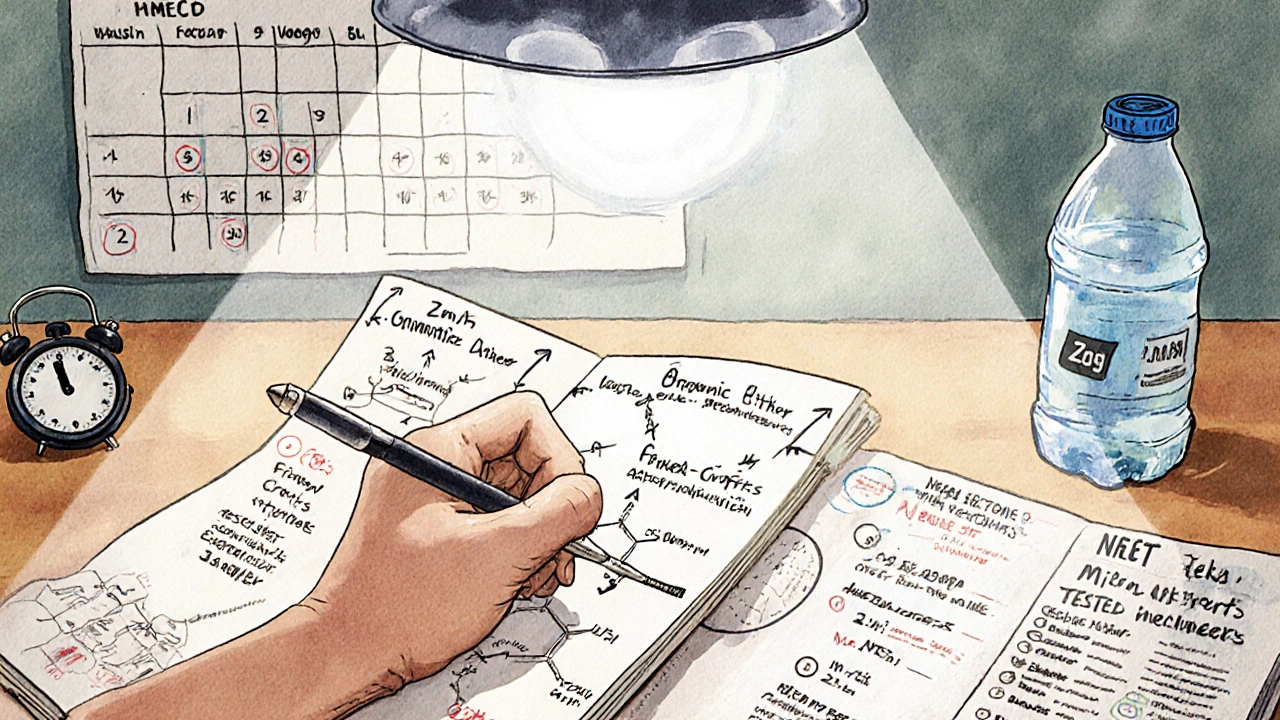NEET Study Time Estimator
Find your ideal study plan for NEET based on your current knowledge level and target score. This tool helps you allocate time efficiently across Biology, Chemistry, and Physics for maximum score potential.
Your Personalized Study Plan
Based on your inputs, here's how to optimize your NEET preparation. Focus on Biology first as it carries the highest weightage (50% of the exam).
Subject Breakdown
Based on NEET exam patterns, questions from Biology are mostly direct from NCERT with little variation. Focus on:
- Human Physiology (20+ questions)
- Genetics and Evolution (formula-based)
- Ecology and Environment (NCERT line-by-line)
If you're aiming for NEET, you're not just studying-you're training for one of the toughest medical entrance exams in the world. Over 2 million students appear every year, and only about 10% clear it with a rank good enough to get into a government medical college. The question isn't just what to study, but how to study it right. The answer isn’t a magic list. It’s a system built on weight, repetition, and smart focus.
Start with Biology-it’s your biggest score booster
Biology makes up 50% of the NEET paper. That’s 90 out of 180 questions. If you nail biology, you’re already halfway to a top rank. But don’t just read chapters. Focus on high-yield areas where questions repeat every year.
- Human Physiology-covers 20+ questions. Master the circulatory system, respiratory exchange, kidney function, and neural control. These are rarely asked in tricky ways-just test your recall of facts and diagrams.
- Genetics and Evolution-Mendel’s laws, pedigree analysis, Hardy-Weinberg principle, and DNA replication mechanisms. These are formula-based. Practice 10-15 problems daily until you can solve them blindfolded.
- Plant Physiology-Photosynthesis, transpiration, plant hormones. These are easy marks if you memorize the flowcharts. Don’t skip the diagrams-they’re worth 2-3 questions every year.
- Ecology and Environment-Biodiversity hotspots, ozone layer, greenhouse effect, and pollution types. This section is mostly NCERT line-by-line. Highlight every bold line in your textbook.
Most toppers say: "I read NCERT Biology twice before touching any reference book." Don’t jump to coaching modules or Allen notes until you’ve memorized NCERT like a song. Every year, 30-40 questions come directly from NCERT text or its diagrams.
Chemistry: Balance theory and reactions
Chemistry is the middle ground-45 questions, split between Physical, Organic, and Inorganic. It’s the subject where you can gain the most in the shortest time.
- Physical Chemistry-Mole concept, chemical equilibrium, thermodynamics, and electrochemistry. These need practice. Solve 20 numericals a day. Don’t just read formulas-derive them once. You’ll remember them longer.
- Organic Chemistry-Reaction mechanisms are king. Focus on named reactions: Williamson ether synthesis, Friedel-Crafts, Aldol condensation, and haloform reaction. Draw the mechanism 3 times. Then test yourself without notes.
- Inorganic Chemistry-This is pure memory. Periodic table trends, transition metals, coordination compounds, and qualitative analysis. Make flashcards for each element’s properties. Revise them every morning for 15 minutes.
Many students lose marks here because they skip the "exceptions". Like why copper has +1 oxidation state more often than +2? Or why Zn, Cd, Hg don’t show variable valency? These are favorite NEET traps. Write them down in a separate notebook. Review it weekly.
Physics: Master the patterns, not the problems
Physics is the hardest to score in-but also the most predictable. 45 questions, but 70% come from 12 core topics. Don’t waste time on obscure derivations.
- Electrostatics and Current Electricity-Coulomb’s law, capacitor combinations, Kirchhoff’s laws. These are calculation-heavy. Practice circuit diagrams until you can solve them in under 90 seconds.
- Magnetism and Electromagnetic Induction-Faraday’s law, Lenz’s law, motional EMF. These questions are often based on direction of induced current. Use the right-hand rule religiously.
- Optics-Ray diagrams for lenses and mirrors. Learn the sign convention once and stick to it. Every year, 4-5 questions test this.
- Modern Physics-Photoelectric effect, Bohr’s model, nuclear fission/fusion, half-life. These are conceptual. Read the NCERT explanation twice. Then try explaining it to someone who knows nothing about physics.
Don’t solve 100 problems from different books. Solve 20 problems from past NEET papers-5 times each. You’ll start seeing the same patterns: how they twist a simple formula, where they hide the trick, which options are common distractors.

NCERT is your Bible-everything else is commentary
Coaching materials, YouTube channels, and paid apps can help. But they’re supplements. The real exam? It’s built on NCERT. A 2024 analysis of NEET papers showed that 87% of biology questions, 72% of chemistry, and 65% of physics came directly from NCERT textbooks or their diagrams.
Here’s how to use NCERT right:
- Read each chapter once slowly.
- Underline every definition, formula, and diagram.
- After reading, close the book and write down everything you remember.
- Check your notes against the text. Add what you missed.
- Repeat this for every chapter. Do this twice before moving to any other resource.
Many students spend months on advanced books and still fail because they didn’t master the basics. NEET doesn’t test how much you know-it tests how well you know the syllabus.
Time management: Study smart, not long
You don’t need to study 16 hours a day. You need to study with focus.
Here’s a realistic daily plan that works for top scorers:
- 6:30-8:00 AM-Biology revision (flashcards + diagrams)
- 8:30-10:30 AM-Physics practice (numericals from past papers)
- 11:00 AM-1:00 PM-Chemistry (reaction mechanisms + inorganic revision)
- 3:00-5:00 PM-Topic-wise MCQs (use NEET previous year papers)
- 7:00-8:00 PM-Weak area review (what you got wrong that day)
Take Sundays off. Or use them for a full mock test. But don’t burn out. NEET is a marathon, not a sprint.

Mock tests: Your real predictor of success
Don’t wait until April to take a mock test. Start by December. Take one every two weeks. Analyze it like a doctor analyzes a patient:
- Which subject gave you the lowest score?
- Which topic had the most wrong answers?
- Did you run out of time? If yes, which section slowed you down?
- Did you make silly mistakes? Circle them. Don’t let them happen again.
Top scorers don’t just take mocks-they dissect them. They keep a mistake journal. Every wrong answer gets written down with the reason: "Didn’t remember the formula," "Misread the question," "Confused two reactions."
What NOT to study
Here’s what wastes time:
- Advanced physics problems from IIT JEE books
- Extra chapters not in NCERT
- Watching 2-hour YouTube lectures on topics you already know
- Buying 10 different books and reading none of them fully
NEET doesn’t test genius. It tests consistency. If you know NCERT inside out, practice past papers, and fix your mistakes-you’ll beat someone who studied 3 times harder but less smartly.
Is coaching necessary for NEET?
No, coaching isn’t mandatory. Many toppers cleared NEET with self-study using NCERT, past papers, and free YouTube resources. But coaching helps if you need structure, regular tests, and doubt-clearing. If you’re disciplined and can stick to a schedule, you can do it alone. If you struggle with motivation or time management, coaching gives you accountability.
How many hours should I study daily for NEET?
Focus on quality, not quantity. 6-8 focused hours a day with revision and mock tests is better than 12 distracted hours. Top performers usually study 7-8 hours on weekdays and 8-10 on weekends. The key is consistency-not marathon sessions.
Can I crack NEET in 6 months?
Yes, if you start from scratch and follow a strict plan. Focus only on NCERT and past 10 years’ papers. Skip advanced topics. Prioritize biology, then chemistry, then physics. Dedicate 4-5 hours daily to active practice, not passive reading. With discipline, 6 months is enough to clear the cutoff. Getting into a top college? That’s harder.
Which subject is the most scoring in NEET?
Biology is the most scoring. It has the highest weightage and questions are mostly direct from NCERT. With focused revision, you can score 320+ out of 360 in biology alone. Chemistry is next-easier to improve quickly. Physics is toughest to score high in, but you can still gain 60-70 marks with smart prep.
Should I solve previous year papers before or after studying a chapter?
After. Study the chapter first, understand the concepts, then solve related questions. Solving papers before learning leads to confusion. But once you’ve covered a topic, solve 5-10 past questions on it. This tells you what’s important and how it’s asked.
Final tip: Your mindset matters more than your schedule
NEET isn’t about being the smartest. It’s about being the most consistent. The student who wakes up at 6:30 every day, reviews their mistake journal, and stays calm during mocks will beat the one who crams for 12 hours the night before.
Every year, thousands of students quit in January or February because they feel behind. Don’t be one of them. Progress isn’t linear. Some days you’ll feel stuck. That’s normal. Keep going. The exam doesn’t care how you feel. It only cares what you know on test day.
Study smart. Stick to the plan. Trust the process. And remember-your future self is already thanking you for starting today.

